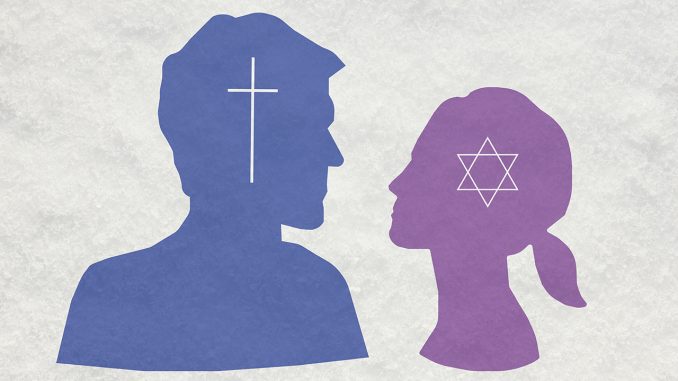
When Simone Allegra Lavine started dating her current partner, she said one of the first questions her parents asked her was, “Is he Jewish?”
Lavine is a senior human development and community engagement major who was raised by two Jewish parents.
“I said, ‘No,’” said Lavine, whose partner was raised Catholic. “It wasn’t a big deal, but they wouldn’t have asked if they didn’t care.”
Interfaith marriages in the Jewish community were historically viewed as “taboo,” or even shunned, according to My Jewish Learning, a nonprofit Jewish media organization.
Now, some studies show they are growing in American society.
According to the Jewish People Policy Institute, a nonprofit think tank based in Israel, about half of non-Haredi Jewish people ages 25 to 29 in America are married to a non-Jewish spouse. Additionally, a 2015 study by the Pew Research Center found that nearly half of unmarried American couples lived with someone of a different faith.
“I would never not date someone because they had a different religion, race or background than me,” Lavine said. “But in our parents’ generation, it’s something that comes up.”
Lavine invites her partner to participate in Jewish holidays and traditions and they both enjoy learning about their different customs, she said. She invited him to a Hanukkah party and to participate in Tashlikh, a customary Jewish atonement ritual performed on the first day of Rosh Hashanah.
Ashley Bryant, a senior information science and technology major, experienced interfaith dating from the other side of the relationship. Bryant practices Catholicism with Italian traditions and had a Jewish partner. Both of their families respected the other’s beliefs, she said.
“It was really cool to experience that culture because it was very similar to my upbringing,” Bryant said. “It seemed like there were a lot of morals and family values that mirrored each other.”
In 2000, an American Jewish Committee survey of 254 people in mixed married, inmarried and conversionary households found 63 percent of children in mixed-married homes being raised Jewish and 19 percent raised in two religions.
History and Jewish Studies professor Lila Corwin Berman said many rabbis will not perform intermarriages because it is contrary to Judaic principles. Some Jews worry intermarriage will erode the stability of Jewish life and result in raising non-Jewish children, Berman added.
Anna Bywater, a sophomore international business major, made the personal choice to identify as Jewish within her interfaith upbringing. She is currently on the board of MEOR, a Jewish organization at Temple that provides “innovative Jewish learning and experiences,” according to the organization’s Facebook page.
Bywater has relatives on both sides of her family who converted from Catholicism to Judaism after marrying Jewish spouses. Her father is the only one who did not convert after marrying a Jewish woman.
Bywater is in an interfaith relationship and introduced her partner to Jewish traditions like Passover seders, which is a lesson of Jewish history, literature and religion, and Shabbat, a day of rest and spiritual enrichment. Her partner took an interest in Judaism through this, she said.
Intermarriage rates have increased in the past 50 years, according to the Pew Research Center.
Younger generations witness more acceptance for interfaith relationships, and more Jewish institutions have created programs that specifically engage interfaith couples and families, Berman said.
Ande Silverman is a senior psychology major whose mother is ordained as a rabbi and practicing cantor, an ordained clergy position responsible for the musical expression of Jewish prayer, was raised in an all-Jewish household. While her parents did not pressure her into dating another Jewish person, Silverman considers incorporating her religion into her relationships important.
“I feel a responsibility to continue practicing the Jewish religion and Jewish traditions,” she said. “Even if I marry someone who is not Jewish, it would still be very important to me that they would agree to raise a family that’s at least half Jewish, half whatever religion.”



Be the first to comment